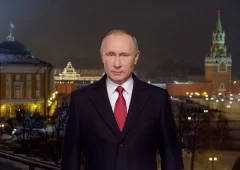Polymarket Faces Major Outflows After US Election Bets Settle
08.11.2024 22:00 2 min. read Kosta Gushterov
Polymarket, a popular betting platform, has seen a significant drop in its value following the resolution of its largest-ever betting market - the US presidential election.
This event, which had pushed the platform’s total value locked (TVL) to new heights, has now led to a major outflow of funds. Polymarket’s value locked plummeted by nearly 50%, from $511 million on November 6 to just $181 million. Despite offering zero fees and attracting considerable interest, the platform couldn’t prevent the outflows.
The decline in interest mirrors trends seen with other political betting tokens, which lost their appeal once their associated events were settled. Although Polymarket still offers a variety of political bets, these now occur at much lower volumes compared to the surge around the election. The large influx of high-stakes bets, particularly around Donald Trump’s ‘Yes’ token, drove much of the platform’s growth, with some whales contributing up to $70 million. However, with the election settled, sports betting has reclaimed the top spot on Polymarket.
In response to the outflows, Polymarket hinted at an upcoming airdrop, though it failed to halt the cash-outs, especially from the platform’s larger investors. The airdrop, which has been anticipated for some time, might target both small and large bettors, with the potential requirement to hold liquidity on the platform. The full criteria for the airdrop remain unclear, but it is expected that withdrawing earnings may disqualify some users.
Following the election, Polymarket’s activity has reverted to levels seen before the market surge in October. The once active user base has dwindled, with daily trader counts returning to early October figures. The platform’s largest traders, particularly whales, have already reaped their rewards. One notable trader, Theo4, a French investor, earned over $47 million, making one last bet on Kamala Harris’s popular vote outcome before the market’s resolution.
-
1
Ripple’s Stablecoin Gains Global Reach Through Alchemy Pay Integration
18.06.2025 8:00 1 min. read -
2
ARK Invest Takes Early Profits After Circle’s Skyrocketing IPO
18.06.2025 9:00 1 min. read -
3
FSB Flags Mounting Crypto Risks as Stablecoins Tighten Grip on Finance
13.06.2025 11:00 2 min. read -
4
Coinbase Picks Luxembourg for Its New EU Headquarters, Secures MiCA License
21.06.2025 11:00 1 min. read -
5
Crypto Market May Be in Early Stages of Multi-Year Rally, Says Real Vision CEO
21.06.2025 17:00 2 min. read
Weekly Recap: Key Shifts and Milestones Across the Crypto Ecosystem
The first week of July brought notable advancements in crypto infrastructure, governance, and trading.
EU Risks Falling Behind in Digital Finance, Warns Former ECB Board Member
Europe’s reluctance to embrace stablecoins and blockchain technology could erode its monetary sovereignty and marginalize the euro in the next phase of global finance, according to former European Central Bank board member Lorenzo Bini Smaghi.
Toncoin Launches UAE Golden Visa Program Through $100,000 Staking Offer
Toncoin (TON) has unveiled an exclusive partnership with the United Arab Emirates (UAE) to offer users a path to the coveted 10-year UAE Golden Visa—through crypto staking.
White House Advisor Points Out What Could Push Crypto Market to $20 trillion
Bo Hines, the U.S. President’s Chief Advisor on Digital Assets, believes that upcoming stablecoin legislation could catapult the digital asset market to unprecedented heights. In a recent statement,
-
1
Ripple’s Stablecoin Gains Global Reach Through Alchemy Pay Integration
18.06.2025 8:00 1 min. read -
2
ARK Invest Takes Early Profits After Circle’s Skyrocketing IPO
18.06.2025 9:00 1 min. read -
3
FSB Flags Mounting Crypto Risks as Stablecoins Tighten Grip on Finance
13.06.2025 11:00 2 min. read -
4
Coinbase Picks Luxembourg for Its New EU Headquarters, Secures MiCA License
21.06.2025 11:00 1 min. read -
5
Crypto Market May Be in Early Stages of Multi-Year Rally, Says Real Vision CEO
21.06.2025 17:00 2 min. read


